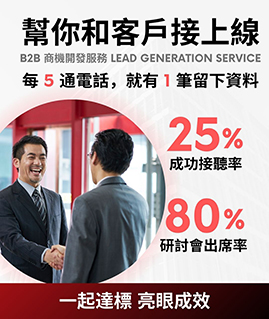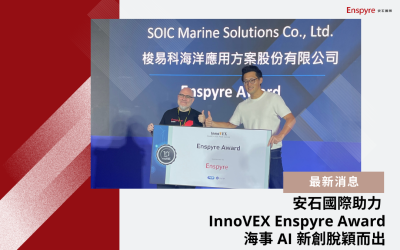[Taipei Times]
以台灣為基地的業務:外國人普遍認為環境有利於創業; 只是不要指望銀行提供太多幫助
TAIWAN-BASED BUSINESS: Foreigners here generally say that the environment is conducive to starting up a business; just don’t expect much help from the banks
By Graham Norris
CONTRIBUTING REPORTER
While representing a Dutch industrial design company in Taiwan during the late 1990s, Case Engelen noticed there was an insurmountable communication gap between designers in the West and manufacturers in Taiwan.
“I realized that it would be useful to have the designers in Taiwan, so they could work more closely with the manufacturers,” Engelen said. “That’s what gave me the idea to start a company.”
So five years ago, he took the leap and set up Titoma, hiring designers from France, Germany, the UK and the US to work with local manufacturers on projects developed in the West.
Now Engelen’s company employs 10 people, with offices in the UK, Germany, the US and China, and had sales of US$1 million last year, a figure he expects to rise to around US$3 million this year.
Engelen is one of numerous foreigners who are taking advantage of Taiwan’s entrepreneurial society and liberal, albeit slightly bureaucratic, regulations for companies.
Small and medium-sized enterprises make up 97 percent of all companies in Taiwan, but working out exactly how many of these are owned by foreigners is difficult, as the Ministry of Economic Affairs doesn’t distinguish between companies that are owned by foreigners locally and those set up as subsidiaries of foreign multinationals.
Ann Hu, a certified public accountant with Universal Law CPA Group, helps between 30 and 50 foreigners set up companies here every year. She said the process is quite simple, especially if you have an accountant or lawyer deal with the procedure for you.
“The government’s attitude is quite welcoming,” she said. “They will usually approve an application.”
She said that in her experience, the most common type of company that foreigners set up was a trading company, but that the government was even more open to those who wanted to set up any kind of high-tech enterprise.
When Engelen set up his company nearly five years ago, he was lucky enough to have gone through the process with his former company, WeLL Design. He decided that, because he wanted to hire a lot of foreigners, it would be easier to persuade the government of his need to hire people from overseas if the parent company was foreign.
So he first set up a holding company in Hong Kong, and then set up its branch company here. He said the process was relatively simple, and required only time and a lot of documentation — as well as NT$2.5 million. Even so, he said it was a struggle at first to get Alien Resident Certificates (ARC) for his foreign employees. He had to prove to the government he couldn’t find Taiwanese employees suitable for the job, and that the foreigners he wanted to hire had years of experience.
One way around the problem was to use AISEC, an international student organization that runs an exchange program to allow around 3,500 students a year to live and work in another country. Engelen said he employed a German student for a year through the program for one of his projects.
Most companies can apply for an ARC for the general manager, but if the company plans to hire other foreigners, the minimum investment requirement is usually NT$5 million.
Michael Lee, a partner in the Pamir Law Group, said that while there was no set limits on the hiring of foreigners, in practice the government would take into consideration a number of factors when deciding how many foreigners a company can hire.
The government, usually the Council of Labor Affairs, would look in particular at the company’s revenues and ratio of foreign to local workers, Lee said. In the first year, the government will estimate the revenues of the company, but in further years the company will have to prove it’s earning money to be able to hire more foreigners. The company will also have to prove the foreign workers they want to hire are qualified. Once a company is operating and making money, a further consideration is expansion and how to fund it.
Investing more money from abroad requires the approval of the MOEA’s Investment Commission, although this isn’t usually hard to get. The rules on raising money from Taiwanese individuals, if you can find them, are also quite relaxed. But institutional investors are not so welcoming.
Elias Ek, president of Enspyre, which provides business services to small and medium-sized enterprises, encountered this problem when trying to raise expansion funding from banks.
“The banks here are basically racist,” Ek said. “It doesn’t matter what your business plan says, if you’re a foreigner they just won’t look at it.”
He said banks had shown him regulations barring foreigners from borrowing money from them that were apparently based on law, but after extensive enquiries he could not find the law and assumed it had, unknown to the banks, been repealed some time ago.
Foreigners were disadvantaged in such a situation because, unlike Taiwanese, they could not so easily turn to family members for investment funds. And even when banks do lend money, they only do so if the entire loan is backed by collateral.
“There are no banks here, only pawn shops,” Ek said, adding that to realize his plan of having 1,000 offices open in 10 years, he might have to move his headquarters out of Taiwan if financing from banks didn’t become easier.
On the upside, Ek said, almost everything else here was simpler than in his home country, Sweden, and the entrepreneurial spirit in Taiwan was infectious.
“In Sweden people are very reluctant to take risks by starting a new business,” he said. “But here there is a mentality, an optimism, that means Taiwanese are very good at taking the leap.”
However, taking the leap in Taiwan can mean shouldering a lot more responsibility that entrepreneurs do in the West.
Lee at law firm Pamir said that while opening and running a company in Taiwan was no easier or more difficult than in other places, one main difference between operating a company here and in the West was that in Taiwan the general manager, registered as the “responsible person,” is personally, and criminally, liable for the actions of the company.
“Everything that’s stamped with the company chop also has to be stamped with the person’s own chop, so that person is always responsible for what happens,” Lee said. “That’s probably the biggest thing for foreigners to think about.”
He said the managers of some established foreign companies planning to set up subsidiaries or branches in Taiwan preferred to find locals to become the “responsible person” because they weren’t used to the idea that they would be personally responsible for the company’s actions.
“If the company defrauds somebody, the `responsible person’ potentially could go to jail, and that’s something that doesn’t happen in Western countries,” Lee said, adding that in practice the jailing of the “responsible person” happened only in extreme cases.
Foreign entrepreneurs in Taiwan say the environment here is conducive to doing business, with the costs of operating a company quite low and regulations reasonably clear. Hu of Universal Law said that while accountants or lawyers could take care of most of the bureaucratic burden, foreigners, just like any entrepreneurs anywhere, had to think clearly about what they were doing before embarking on starting a company.
“The registration part is quite straightforward,” she said. “The important thing is that you have a plan for your business, how much money you will need and what the key issue will be to make your company succeed.”
Some sectors of the economy are off-limits to foreigners, either because they are sensitive, dangerous or protected. Foreigners may not invest, for example, in companies related to the production of various kinds of chemicals, the postal service, certain agricultural products, radio and television broadcasting, and various kinds of military equipment.
As for the tax issue, companies basically have to pay 25 percent tax on profit every year and a 5 percent sales tax every two months, said Ann Hu. Deductibles are quite clear, and there’s not much you can deduct from your taxes anyway.

![[Yahoo新聞] 經濟部 InnoVEX 國際新創競賽 5 獎項入袋](https://www.enspyre.com/wp-content/uploads/2025/06/044c4beb1dc6832097ad0b10fe9dc723-400x250.webp)

![[壹蘋新聞網] InnoVEX 2025創新競賽決賽登場!15強出爐總獎金高達14萬美元](https://www.enspyre.com/wp-content/uploads/2025/06/f5f701f6a66ee4da661b0434621590f5_1280-400x250.webp)